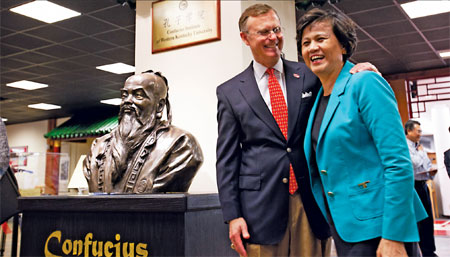US Confucius Institutes gather
Hanban, the nonprofit agency that administers more than 400 Confucius institutes worldwide, will launch a certification test for global educators who teach Chinese to foreigners starting in 2014.
"The standards will be more concise and clearer in form, and closer to other foreign languages' standards in content than before," Zhou Hui, deputy chief of the division of teachers under Hanban, said during the first ever joint meeting of United States Confucius institutes held at Western Kentucky University over the weekend. Around 260 educators from more than 90 Confucius Institutes and several classrooms across the US took part in the event.
Zhou said the test questions will be customized for native speaker and non-native speaker teachers.
"If any local teacher wants to take this test, Hanban will provide free training by online or face-to-face teaching," she said.
All test participants need to prepare themselves by having at least 300 hours of training curriculum, she added.
Xu Lin, director-general of Hanban, said in a keynote speech that qualified teaching resources has been a challenge for the Confucius Institute, which has been on a high-speed track of global expansion in the past nine years.
"We are facing new problems because more foreign students are heading for study opportunities in China, which keeps domestic teaching resources limited in favor of overseas dispatching," she said.
Also, new visa policies and regulations governing teacher certification in the US keep some Chinese teachers from entering the US' Confucius Institutes, she said.
In a move to overcome the problem, Hanban has accelerated the establishment of two kinds of positions in host universities: core teacher positions and a major in teaching Chinese.
Core teachers organize and manage Chinese language teaching at Confucius institutes, while the majors in teaching Chinese are responsible for specialized course work. Both are required to pass tests to qualify with Hanban.
As of September of this year, a total of 60 institutions around the world have been enrolled by the Confucius Institute, 36 of whom are based in the US.
Michael Kahn-Ackermann, the ex-director of the Goethe Institute and currently a special consultant to Hanban, said at the meeting that the Confucius Institute is the only of its kind cross-cultural organization in the world.
"Every Confucius Institute is co-managed by two directors - one from a Chinese university and one foreign," he explained. "That's a different mode compared to other language and culture promotion organizations, such as the British Council, Alliance Franaise and the Goethe Institute."
According to Hanban's latest data, a total of 429 Confucius Institutes and another more than 600 Confucius Classrooms are in operation around the world, spanning 116 countries and regions, and another 400 overseas institutions are on the waiting list.
"It is such a good platform to communicate with educators from other US universities," said Jiang Yu, of Xavier University of Louisiana. "I just shared some experience with a representative from another historically black college about their Chinese teaching courses.
"Around 90 percent of students in our private university come from poor families, and Chinese language learning obviously opens another door for them," he said.
Knowledge gained at a Confucius Institute will help them get more opportunity to change their fate, he said.
Roger Hart, director of the Confucius Institute at Texas Southern University, said that Chinese language and culture teaching has equipped his students to be "more employable".
Huston sees an increasing number of Chinese enterprises setting up overseas branches and bringing more job opportunities to local people.
"American students are passionate about learning Chinese to go hunting for tomorrow's opportunities," he said.
Gary Ransdell, president of Western Kentucky University, said at the meeting that his university was honored to host the first joint meeting of US Confucius Institutes.
He said theConfucius Institute at the universityhas just opened three Confucius classrooms in south central Kentucky, the latest at the Housing Authority of Bowling Green on Sept 25.
"I would say the flagships of the Confucius Institute are in the United States," Xu Lin said at Saturday's meeting.
|
Director-general of Hanban Xu Lin and Western Kentucky University President Gary Ransdell during a tour of the university's Confucius Institute Chinese Learning Center in the campus library. Clinton Lewis / Western Kentucky University |



















